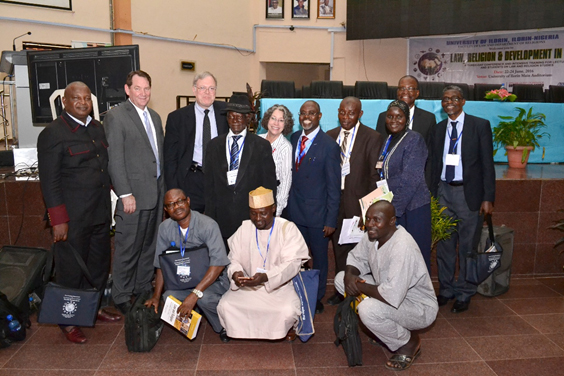





On June 22, 2016, Professor Cole Durham delivered the keynote address and several lectures for a conference and mini-course attended by approximately 500 students and young scholars on "Law, Religion and Development in Africa" at the University of Ilorin, in Ilorin, Nigeria.
The topics covered during the Ilorin conference included:
- Law and Religion Studies in Nigeria: The journey so far.
- Law, Religion and Development.
Additional speakers included Abdul Ganiyu Ambali OON, Vice Chancellor, University of Ilorin; Hon. Justice Suleiman Kawu, Chief Judge, Kwara State; Professor A. G. A. S. Oladosu, Chief Imam University of Ilorin University Muslim Community; Dr. Kayode Adam, Ag. Dean Faculty of Law, University of Ilorin; Honorable Justice Mutalib Ambali; and Justice M.A. Folayan.
- The timing of the conference is appropriate given that religion has generated and is generating conflicts and tensions in Nigeria and in other places across the World.
- The conference noted the symbolistic relationship between law, religion and development.
- The conference agreed that the misunderstanding between law and religion needs to be addressed urgently.
- The conference agreed that the harmony between law, religion and development can lead to peaceful co-existence in diverse societies with far reaching implications on development.
- The conference noted that in many cases, religion is used as an instrument of oppression and there is an urgent need to change the narrative.
- The conference observed with great concern that crimes are sometimes perpetrated in the name of religion and there is need to change the narrative.
- The conference agreed that religion if negatively applied, may constitute an obstacle to development process.
- The conference agreed that law and religion are tools to regulate society and that laws should reflect religious values.
- The conference agreed that a deep reflection on law and religion will lead to the verdict that a good law will always find its roots in religion.
- The conference observed that religious organizations are useful agents of development citing examples of their positive impact on health care and other interventions.
- The conference noted that failure of development discourse to consider religion is a major impediment to the development process.
- Freedom of religion is a must in modern nation states especially pluralistic societies.
- The conference further observed that freedom of religion protects the interest of everyone including adherents of all religious groups.
- The conference emphasized the imperatives of mutual respect and accommodation between adherents of different religions.
- The conference noted that there are many cases involving law and religion issues in the municipal and international courts, advising that such cases be handled with caution to avoid tension.
- The conference advised that courses on law and religion be mounted in tertiary institutions to encourage the knowledge and understanding of law and religion issues.
- The conference noted that failure of states to address basic governance issues will lead to the intervention of religious organizations to step into the vacuum with far reaching implications on the society.
- The conference noted that certain traditional beliefs are central to the cohesiveness of African societies and ought not to be ignored in the developmental process.
- The conference reflected on the theme of law, religion and development in Africa, observing that religion teaches individuals on what to do, law teaches individuals what not to do, and the obedience of both ultimately resulting in development.
